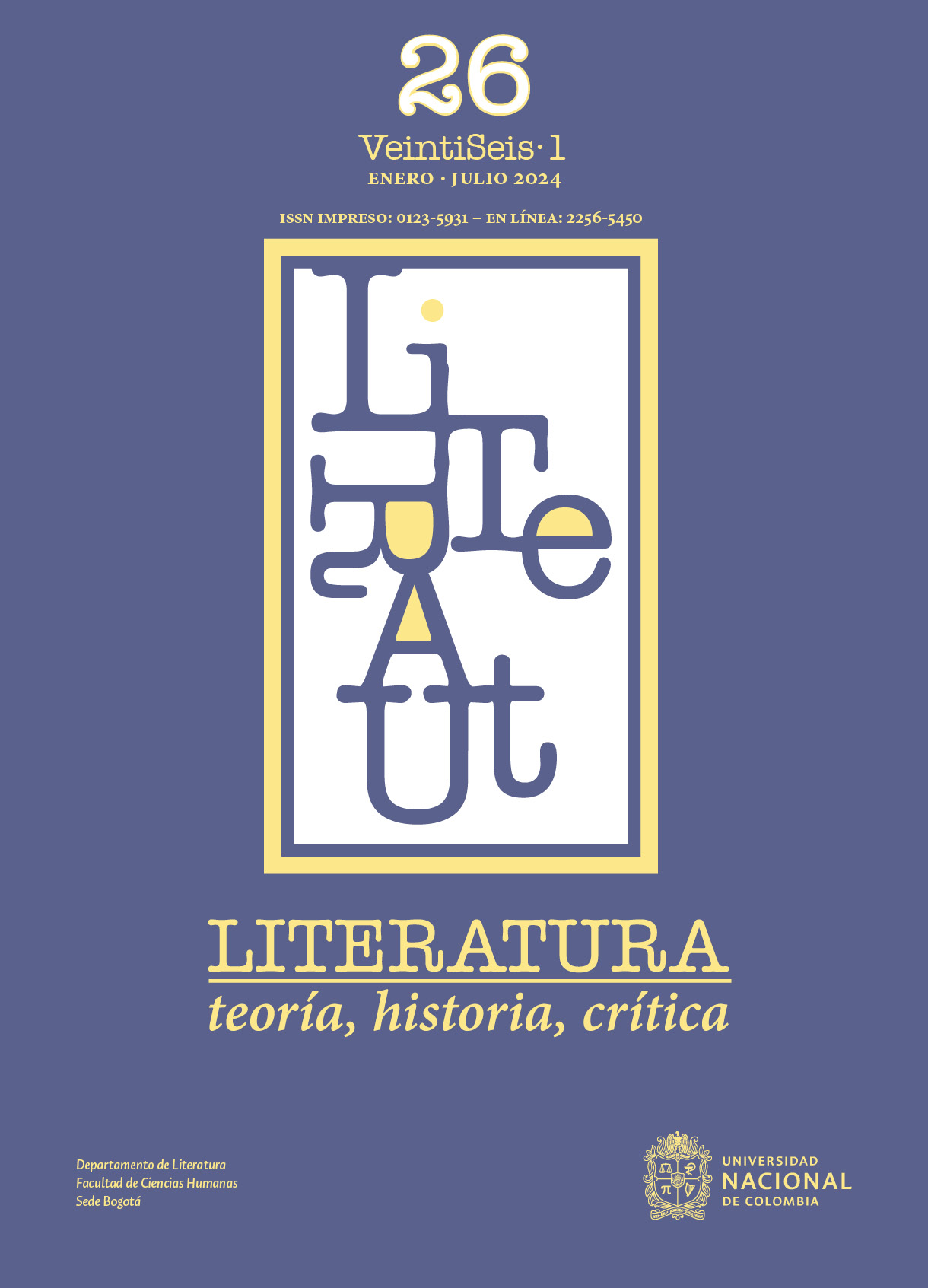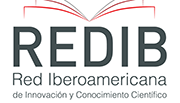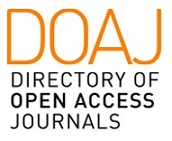Clubes de lectura: una revisión sistemática internacional de estudios (2010-2022)
Book Clubs: An International Systematic Review of Studies (2010-2022)
Clubes de leitura: uma revisão sistemática internacional de estudos (2010-2022)
DOI:
https://doi.org/10.15446/lthc.v26n1.107317Palabras clave:
club de lectura, comunidad lectora, bibliografía analítica, educación internacional, base de datos (es)book club, reading community, analytical bibliography, international education, database (en)
clube de leitura, comunidade de leitura, bibliografia analítica, educação internacional, base de dados (pt)
Descargas
En numerosos países se desarrollan clubes de lectura y prácticas de lectura que implican diálogo entre los lectores sobre obras literarias. En este artículo se presenta un análisis bibliográfico internacional de esta práctica para conocer el estado actual de la investigación en el campo. Se seleccionan los 180 estudios sobre clubes de lectura en el periodo 2010-2022 que identifica la Web of Science. Se han filtrado a partir de unos parámetros (título, idioma y tipo de documento). Tras su lectura, se estimaron 81 para el análisis bibliográfico final, que se realizó conforme a 11 indicadores: disciplina, temática, territorio, lengua, tipo de estudio, técnicas de investigación, sujetos, tipo de club, resultados, conclusiones y limitaciones. Los resultados muestran que los clubes de lectura reciben buenas valoraciones y que predominan los estudios cualitativos, locales y regionales. Por ello, es necesario contar con estudios con muestras más amplias y de carácter nacional o internacional.
In many countries book clubs and reading practices involving dialogue among readers about literary works are developed. In this article we present an international literature review of this practice to get an overview of the current state of research in the field. We selected the 180 studies on book clubs in the period 2010-2022 identified by the Web of Science. They were filtered according to determined parameters (title, language and type of document). After reading them, 81 were estimated for the final bibliographic analysis, that was carried out according to eleven indicators: discipline, subject, territory, language, type of study, research techniques, subjects, type of club, results, conclusions, and limitations. The results show that book clubs are highly rated and that qualitative, local and regional studies predominate. Therefore, there is a need for studies with larger samples and of a national or international nature.
Os clubes de leitura e as práticas de leitura que envolvem o diálogo sobre obras literárias entre leitores se desenvolvem em muitos países. Neste artigo, apresentamos uma revisão da literatura internacional sobre esta prática, a fim de obter uma visão geral do estado atual da investigação neste domínio. São selecionados os 180 estudos sobre clubes de leitura no período de 2010-2022 identificados na Web of Science. Estes foram filtrados de acordo com determinados parâmetros (título, língua e tipo de documento). Após a sua leitura, 81 foram estimados para a análise bibliográfica final, que foi efetuada de acordo com onze indicadores: disciplina, tema, território, língua, tipo de estudo, técnicas de investigação, sujeitos, tipo de clube, resultados, conclusões e limitações. Os resultados mostram que os clubes de leitura são muito apreciados e que predominam os estudos qualitativos, locais e regionais. Por isso, há necessidade de estudos com amostras maiores, nacionais ou internacionais.
Referencias
Agustín Lacruz, María del Carmen, y Eva Morera Gracia. “Los clubes de lectura en Aragón: análisis descriptivo de una práctica socio-cultural de animación y promoción lectora”. Revista General de Información y Documentación, vol. 26, núm. 2, 2016, págs. 583-603. DOI: https://doi.org/10.5209/RGID.54716
Álvarez-Álvarez, Carmen. “A Qualitative Study on Book Clubs y Dialogic Literary Gatherings in Spain y Brazil”. Public Library Quarterly, vol. 38, núm. 1, 2019, págs. 72-84. doi: https://doi.org/10.1080/01616846.2018.1530032
Álvarez-Álvarez, Carmen.“Clubs de lectura. ¿Una práctica relevante hoy?”. Información, Cultura y Sociedad, vol. 35, núm. 1, 2016, págs. 91-106.
Álvarez-Álvarez, Carmen. “Book Clubs: An Ethnographic Study of an Innovative Reading Practice in Spain”. Studies in Continuing Education, vol. 38, núm. 2, 2016, págs. 228-42. doi: https://doi.org/10.1080/0158037X.2015.1080676
Álvarez-Álvarez, Carmen, y Julián Pascual-Díez. “Contributions of a School Book Club to Encourage Reading for Pleasure”. Profesional de La Informacion, vol. 23, núm. 6, 2014. doi: https://doi.org/10.3145/epi.2014.nov.10
Álvarez-Álvarez, Carmen, y Julián Pascual-Díez. “Aportaciones de un club de lectura escolar a la lectura por placer”. El Profesional de la Información, vol. 23, núm. 6, 2014, págs. 625-632. doi: https://doi.org/10.3145/epi.2014.nov.10
Álvarez-Álvarez, Carmen, y Julián Pascual-Díez. “Reading Clubs in the Context of Spanish Public Libraries. Current Situation y Future Prospects”. Investigación Bibliotecológica, vol. 32, núm. 76, 2018, doi: https://doi.org/10.22201/iibi.24488321xe.2018.76.57972
Álvarez-Álvarez, Carmen, y Julián Pascual-Díez. “Los clubes de lectura en el contexto de las bibliotecas públicas de España. Situación actual y perspectivas de futuro”. Investigación Bibliotecológica: Archivonomía, Bibliotecología e Información, vol. 32, núm. 76, 2018, págs. 13. doi: https://doi.org/10.22201/iibi.24488321xe.2018.76.57972
Álvarez-Álvarez, Carmen, y Rocío Vejo-Sainz. “Improving Literary Competence with a School Reading Club”. Biblios, núm. 68, 2017. doi: https://doi.org/10.5195/biblios.2017.351
Bassett, Troy. “Evidence of Reading: The Social Network of the Heath Book Club”. Victorian Studies, vol. 59, núm. 3, 2017, págs. 426-435, https://doi.org/doi:10.2979/victorianstudies.59.3.06
Beach, Richard, y Steven Yussen. “Practices of Productive Adult Book Clubs”. Journal of Adolescent y Adult Literacy, vol. 55, núm. 2, 2011, págs. 121-131, doi: https://doi.org/10.1002/JAAL.00015
Bemiss, Elizabeth Mc Call, et al. “Learning from Students behind the Fence: A Critical Book Club with Incarcerated Youth”. English Teaching, vol. 16, núm. 2, 2017, págs. 268-284. doi: https://doi.org/10.1108/ETPC-05-2016-0067
Brown, Laila, y Valerie Brett Shaindlin. “Not Just for Patrons: Book Club Participation as Professional Development for Librarians”. The Library Quarterly, vol. 91, núm. 4, págs. 420-436, doi: https://doi.org/10.1086/715924
Chaaban, Youmen, y Rania Sawalhi. “Promoting Reading in the Arab World: The Book Club Model”. ifla Journal, vol. 44, núm. 4, 2018, págs. 269-280, doi: https://doi.org/10.1177/0340035218806541
Chan, Kylie. “The Book Culture Club: Incorporating a Synergistic Approach Among an Academic Library, Authors, Potential Authors, y Publishers”. College y Undergraduate Libraries, vol. 22, núm. 1, 2015, págs. 21-34. doi: https://doi.org/10.1080/10691316.2015.1001241
Chaudhri, Amina, y Nicole Schau. “Imaginary Indians: Representations of Native Americans in Scholastic Reading Club”. Children’s Literature in Education, vol. 47, núm. 1, 2016, págs. 18-35. doi: http://doi.org/10.1007/s10583-015-9255-1
Chaves Barrera, Camila, y Claudia Marcela Chapetón. “Creating a Book Club with a Critical Approach to Foster Literacy Practices”. Folios, núm. 50, 2019, págs. 111-25. doi: https://doi.org/10.17227/folios.50-10224
Chen, Zhen Troy, y La Mei Chen. “Chinese ‘Female Force’ in an ‘American Factory’: Women’s Identity Formation in an English Reading Club”. Asian Journal of Women’s Studies, vol. 27, núm. 2, 2021, págs. 161-183. doi: https://doi.org/10.1080/12259276.2021.1913850
Childress, C. Clayton, y Noah E. Friedkin. “Cultural Reception y Production: The Social Construction of Meaning in Book Clubs”. American Sociological Review, vol. 77, núm. 1, 2012, págs. 45-68. doi: https://doi.org/10.1177/0003122411428153
Choi, Jayoung, y Gertrude Tinker Sachs. “Adolescent Multilinguals’ Engagement With Religion in a Book Club”. Journal of Adolescent y Adult Literacy, vol. 60, núm. 4, 2017, págs. 415-423. doi: https://doi.org/10.1002/jaal.591
Clarke, Robert, et al. “Reading in Community, Reading for Community: A Survey of Book Clubs in Regional Australia”. Journal of Australian Studies, vol. 41, núm. 2, 2017, págs. 171–83. doi: https://doi.org/10.1080/14443058.2017.1312484
Colwell, Jamie, et al. “Out-of-School Reading y Literature Discussion: An Exploration of Adolescents’ Participation in Digital Book Clubs”. Online Learning Journal, vol. 22, núm. 2, 2018, págs. 221-248, doi: https://doi.org/10.24059/olj.v22i2.1222.
Cooper, Christopher A. “Not Just for Oprah Anymore: Incorporating Book Clubs into Political Science Classes”. Journal of Political Science Education, vol. 15, núm. 3, 2019, págs. 365-376. doi: https://doi.org/10.1080/15512169.2018.1473783
Craig, Christy M. “Exploring Gendered Sexuality Through American y Irish Women’s Book Clubs”. Sexuality y Culture, vol. 20, núm. 2, 2016, págs. 316-335, doi: https://doi.org/10.1007/s12119-015-9326-x.
Cuesta, Carolina. “La enseñanza de la literatura y los órdenes de la vida: lectura, experiencia y subjetividad”. Literatura: teoría, historia, crítica, vol. 15, núm. 2, 2013, págs. 97-119.
Dantas, Taisa, et al. “Lectura literaria juvenil: los clubes de lectura como entornos de investigación”. Ocnos, vol. 16, núm. 2, 2006, págs. 121-128. doi: https://doi.org/10.18239/ocnos.
De Paiva Soares, Henrique, y Denise Ismênia Bossa Grassano Ortenzi. “Exploring Literature in English Teaching”. Revista Da Anpoll, vol. 52, núm. 1, págs. 71-93, doi: https://doi.org/10.18309/ranpoll.v52i1.1529.
Diller, Marselline, y Alice Hays. “Reading, Research y Relationships in a Third- Grade Virtual Book Club.” Reading Teacher, vol. 0, núm. 0, 2022, págs. 1–10, doi: https://doi.org/10.1002/trtr.2147.
Dynia, Jaclyn M., et al. “Impact of Library-Based Summer Reading Clubs on Primary-Grade Children’s Literacy Activities y Achievement.” Library Quarterly, vol. 85, núm. 4, 2015, págs. 386-405. doi: https://doi.org/10.1086/682733.
Edwards, Elizabeth Skidmore, et al. “Participation in a Weekly Physical Activity–Related Book Club Improves Health Outcomes over 12 Weeks in Rural Women”. Translational Journal of the American College of Sports Medicine, vol. 6, núm. 3, 2021, págs. 1-6. doi: https://doi.org/10.1249/tjx.0000000000000165.
Eagleton, Terry. Una introducción a la teoría literaria. Ciudad de México, Fondo de Cultura Económica, 1988.
Ehlers, Diane K., et al. “Can an Evidence-Based Book Club Intervention Delivered via a Tablet Computer Improve Physical Activity in Middle-Aged Women?”. Telemedicine y E-Health, vol. 21, núm. 2, 2015, págs. 125-131. doi: https://doi.org/10.1089/tmj.2013.0360.
Fundación Germán Sánchez Ruipérez. Ebook-18: Los lectores niños y jóvenes y los libros electrónicos. Peñaranda de Bracamonte: Centro de Desarrollo Sociocultural, 2012.
Gardiner, Veronica, y Wendy Cumming-Potvin. “Conceptual y Contextual Contradictions: How a Group of Primary School Teachers Negotiated Professional Learning in a Multiliteracies Book Club”. Australian Journal of Teacher Education, vol. 40, núm. 7, 2015, págs. 15-31. doi: https://doi.org/10.14221/ajte.2015v40n7.2.
Griffard, Phyllis Baudoin, et al. “Developing the Inner Scientist: Book Club Participation y the Nature of Science”. cbe Cell Biology Education, vol. 12, núm. 1, 2013, págs. 80-91. doi: https://doi.org/10.1187/cbe.12-02-0020.
Gritter, Kristine. “Promoting lively literature discus sion”. The reading teacher, vol. 64, núm. 6, 2011, págs. 445-449. doi: http://dx.doi.org/10.1598/RT.64.6.7
Haley, Jen, et al. “Interprofessional Collaboration between Health Sciences Librarians y Health Professions Faculty to Implement a Book Club Discussion for Incoming Students”. Journal of the Medical Library Association, vol. 107, núm. 4, 2019, págs. 637. doi: https://doi.org/10.5195/jmla.2019.800.
Hammer, Nanna Maria, et al. “Feasibility y Acceptability of Active Book Clubs in Cancer Survivors–an Explorative Investigation”. Acta Oncologica, vol. 56, núm. 3, 2017, págs. 471-478, doi: https://doi.org/10.1080/0284186X.2016.1277036.
Henderson, Rebecca, et al. “Self-Care Perspective Taking y Empathy in a Student-Faculty Book Club in the United States”. Journal of Educational Evaluation for Health Professions, vol. 17, 2020, págs. 1-9. doi: https://doi.org/10.3352/JEEHP.2020.17.22.
Herb, Annika, y David Betts. “Queering the Book Club: Empathy Development Through Young Adult Literature in Australian Discussion Groups.”Children’s Literature in Education, núm. 112, 2022. doi: https://doi.org/10.1007/s10583-022-09512-w.
Ho, Jenni, et al. “The Use of a Book Club to Promote Biomedical Trainee Professional Development”. Heliyon, vol. 8, núm. 1, 2022, doi: https://doi.org/10.1016/j.heliyon.2021.e08675.
Hoffman, A. Robin. “The bfg y the Spaghetti Book Club: A Case Study of Children as Critics”. Children’s Literature in Education, vol. 41, núm. 3, 2010, págs. 234-250. doi: https://doi.org/10.1007/s10583-010-9106-z.
Holman, Leigh Falls, et al. “Book Club Groups to Aid Relational Connection y Trust among Addicted Trauma Survivors”. Journal of Creativity in Mental Health, vol. 14, núm. 1, 2019, págs. 37-53. doi: https://doi.org/10.1080/15401383.2018.1502706.
Hong, Zuway R., y Huann Shyang Lin. “Impacts of a Book Reading Club Intervention on Enhancing Parents’ Positive Thinking”. Journal of Health Psychology, vol. 17, núm. 2, 2012, págs. 273-284. doi: https://doi.org/10.1177/1359105311413481.
Huberty, Jennifer L., et al. “Women Bound to Be Active: Differences in Long-Term Physical Activity between Completers y Noncompleters of a Book Club Intervention”. Journal of Physical Activity y Health, vol. 10, núm. 3, 2013, págs. 368-378. doi: https://doi.org/10.1123/jpah.10.3.368.
Jordan, Jaime, et al. “A Virtual Book Club for Professional Development in Emergency Medicine”. Western Journal of Emergency Medicine, vol. 22, núm. 1, 2021, págs. 108-114. doi: https://doi.org/10.5811/WESTJEM.2020.11.49066.
Jurado, Fabio. “La formación de lectores críticos desde el aula”. Revista Iberoamericana de Educación, vol. 46, 2008, págs. 89-105. DOI: https://doi.org/10.35362/rie460718
Khokhlova, Olga, y Aditi Bhatia. “Bringing Books Back: Enhancing the Understanding of Psychotherapy in Psychology Students Through Book Club Participation”. Teaching of Psychology, vol. 50, núm. 1, 2021, págs. 32-40, doi: https://doi.org/10.1177/00986283211014179.
Knollman-Porter, Kelly, y Samantha K. Julian. “Book Club Experiences, Engagement, y Reading Support Use by People with Aphasia”. American Journal of Speech-Language Pathology, vol. 28, núm. 3, 2019, págs. 1084-1098, doi: https://doi.org/10.1044/2019_AJSLP-18-0237.
Lewis, Mark A., y Margarita Gómez Zisselsberger. “Scaffolding y Inequitable Participation in Linguistically Diverse Book Clubs”. Reading Research Quarterly, vol. 54, núm. 2, 2019, págs. 167-186. doi: https://doi.org/10.1002/rrq.234.
Luyt, Brendan, et al. “Public Library Reading Clubs y Singapore’s Elderly”. Libri, vol. 61, núm. 3, 2011, págs. 205-210. doi: https://doi.org/10.1515/libr.2011.017.
MacGillivray, Laurie, et al. “‘I Feel Normal Here’: The Social Functions of a Book Club in a Residential Recovery Program”. Journal of Language y Literacy Education, vol. 15, núm. 1, 2019, págs. 1-23.
Machin-Mastromatteo, Juan D., y Gloria Lorena Ruiz Coughanour. “The Rise of Reading y Conversation Clubs during Chihuahua’s Violent Times”. Information Development, vol. 35, núm. 3, 2019, págs. 503-506. doi: https://doi.org/10.1177/0266666919855147.
Manley, K. A. “A Matter of Life y Death: A Note on a Religious Book Club in Fethard, County Tipperary, in 1835”. Library y Information History, vol. 32, núm. 1-2, 2016, págs. 123-131. doi: https://doi.org/10.1080/17583489.2015.1128634.
Mulas, María Antonia Moreno, et al. “Conversando En La Nube: Cómo Organizar Un Club de Lectura Virtual”. Revista General de Informacion y Documentación, vol. 27, núm. 1, 2017, págs. 177-200. doi: https://doi.org/10.5209/RGID.56566.
Neville, Mary L. “‘Sites of Control y Resistance’: Outlaw Emotions in an out-of-School Book Club”. English Teaching, vol. 17, núm. 4, 2018, págs. 310-327, doi:https://doi.org/10.1108/ETPC-01-2018-0016.
Nolan, Maggie. “Reading Massacre: Book Club Responses to Landscape of Farewell”. Texas Studies in Literature y Language, vol. 62, núm. 1, 2020, págs. 73-96, doi: https://doi.org/10.7560/tsll62104.
Nolan, Maggie, y Janeese Henaway. “Decolonizing Reading: The Murri Book Club”. Continuum, vol. 31, núm. 6, 2017, págs. 791-801. doi: https://doi.org/10.1080/10304312.2017.1372365.
Norrick-Rühl, Corinna. “Stimulating Our Literature y Deepening Our Culture”. Quaerendo, vol. 47, núm. 3-4, 2017, págs. 222-251. doi: https://doi.org/10.1163/15700690-12341383.
Ochoa, Pablo, y Ruth Quiroa. “Transformative Learning in a Mexican American Mothers’ Book Club”. Reading Teacher, vol. 74, núm. 1, 2020, págs. 19-28, doi: https://doi.org/10.1002/trtr.1898.
Perino, Jeanne, et al. “Neonatal Nurses Book Club: A Novel Approach to Promote Nursing Resilience”. Neonatal Network, vol. 40, núm. 3, págs. 155-160. doi: https://doi.org/10.1891/11-T-723.
Plake, Kimberly S. “Book Club Elective to Facilitate Student Learning of the Patient Experience with Chronic Disease”. American Journal of Pharmaceutical Education, vol. 74, núm. 3, 2010. doi: https://doi.org/10.5688/aj740337.
Polleck, Jody N. “Using Book Clubs to Enhance Social-Emotional y Academic Learning with Urban Adolescent Females of Color”. Reading y Writing Quarterly, vol. 27, núm. 1, 2011, págs. 101-128. doi: https://doi.org/10.1080/10573569.2011.532717.
Pruitt, John. “Gay Men’s Book Clubs Versus Wisconsin’s Public Libraries: Political Perceptions in the Absence of Dialogue 1”. The Library Quarterly, vol. 80, núm. 3, 2010, págs. 285-286. doi: https://doi.org/10.1086/652969.
Remedi, Gustavo. “La teoría inevitable: el proceso de la teoría literaria y el desafío de la transmodernidad”. Literatura: teoría, historia, crítica, vol. 21, núm. 2, 2019, págs. 49-82. DOI: https://doi.org/10.15446/lthc.v21n2.78663
Ro, Eunseok. “Facilitating an L2 Book Club: A Conversation-Analytic Study of Task Management”. Modern Language Journal, vol. 102, núm. 1, 2018, págs. 181-198. doi: https://doi.org/10.1111/modl.12450.
Ro, Eunseok. “Going beyond Practicing English: Language Alternation in an L2 Book Club’s Zoom Meeting.” Language Teaching Research, 2022, págs. 1–32. doi:https://doi.org/10.1177/13621688221114731.
Ro, Eunseok. “How Learning Occurs in an Extensive Reading Book Club: A Conversation Analytic Perspective”. Applied Linguistics, vol. 40, núm. 1, 2019, págs. 152-175. doi: https://doi.org/10.1093/applin/amx014.
Ro, Eunseok. “The Reshaping of Participation Practices in a Second Language Book Club”. Journal of Pragmatics, vol. 184, 2021, págs. 89-106. doi: https://doi.org/10.1016/j.pragma.2021.07.024.
Ro, Eunseok, y Alfred Rue Burch. “Willingness to Communicate/Participate’ in Action: A Case Study of Changes in a Recipient’s Practices in an L2 Book Club”. Linguistics y Education, vol. 58, 2020, p. 100821. doi: https://doi.org/10.1016/j.linged.2020.100821.
Robertson, Judith, et al. “Saltwater Chronicles: Reading Representational Spaces in Selected Book Clubs in St. John’s, Newfoundland”. Island Studies Journal, vol. 5, núm. 2, 2010, págs. 141-164. DOI: https://doi.org/10.24043/isj.242
Rodríguez-Soler, Rocío, et al. “Worldwide Trends in the Scientific Production on Rural Depopulation, a Bibliometric Analysis Using Bibliometrix R-Tool.”Land Use Policy, vol. 97, 2020, p. 104787. doi:https://doi.org/10.1016/j.landusepol.2020.104787.
Sabeti, Shari. “‘A Different Kind of Reading’: The Emergent Literacy Practices of a School-Based Graphic Novel Club”. British Educational Research Journal, vol. 39, núm. 5, 2013, págs. 835-852. doi: https://doi.org/10.1002/berj.3009.
Schreuder, Mary Celeste, y Rachelle S. Savitz. “Exploring Adolescent Motivation to Read with an Online YA Book Club”. Literacy Research y Instruction, vol. 59, núm. 3, 2020, págs. 260-275. doi:https://doi.org/10.1080/19388071.2020.1752860.
Segrist, Daniel J., y Elizabeth J. Meinz. “Looking for a Good Read? Running a Psychology Book Club”. Psychology Learning y Teaching, vol. 17, núm. 2, 2018, págs. 219-228. doi: https://doi.org/10.1177/1475725718764486.
Shaikh, Majidullah, et al. “Youth Leadership Development in the Start2finish Running & Reading Club”. Journal of Youth Development, vol. 14, núm. 1, 2019, págs. 112-130. doi: https://doi.org/10.5195/jyd.2019.674.
Skrlac Lo, Rachel, y Angela Wiseman. “‘That’s My Dumb Husband’: Wild Things, Battle Bears y Heteronormative Responses in an Afterschool Reading Club”. Journal of Early Childhood Literacy, 2022. doi: https://doi.org/10.1177/14687984221079008.
Smagorinsky, Peter, y Lindy L. Johnson. “Empathic Framing during Concept Development in Book Club Discussions in a Service-Learning Teacher Education Class”. Language y Sociocultural Theory, vol. 8, núm. 2, 2021, págs. 206-238. doi: https://doi.org/10.1558/lst.18853.
Son, Youngji. “A Trilingual Asian-American Child’s Encounters with Conflicting Selves in the Figured Worlds of a Multicultural Book Club”. Journal of Multilingual y Multicultural Development, vol. 0, núm. 0, 2021, págs. 1–15, doi: https://doi.org/10.1080/01434632.2021.1962330.
Son, Youngji. “Critical Literacy Practices with Bilingual Immigrant Children: Multicultural Book Club in an out-of-School Context”. International Journal of Early Years Education, vol. 30, núm. 2, 2022, págs. 307-321. doi: https://doi.org/10.1080/09669760.2020.1848528.
Sullivan, Karyn, et al. “Fostering Cultural Sensitivity amongst Students of Pharmacy through an Interprofessional Book Club Activity”. Currents in Pharmacy Teaching y Learning, vol. 14, núm. 3, 2022, págs. 379-386. doi:https://doi.org/10.1016/j.cptl.2022.01.015.
Tekgül, Duygu. “Book Club Meetings as Micro Public Spheres: Translated Literature y Cosmopolitanism”. Language and Intercultural Communication, vol. 19, núm. 5, 2019, págs. 380-392. doi: https://doi.org/10.1080/14708477.2019.1581794.
Thelwall, Mike, y Karen Bourrier. “The Reading Background of Goodreads Book Club Members: A Female Fiction Canon?”. Journal of Documentation, vol. 75, núm. 5, 2019, págs. 1139-1161. doi: https://doi.org/10.1108/JD-10-2018-0172.
Thomas, Tandy Chalmers, et al. “Identification Incubators: Reflexivity in Consumer Book Clubs”. Consumption Markets y Culture, vol. 23, núm. 5, 2020, págs. 456-480. doi: https://doi.org/10.1080/10253866.2019.1611564.
Tijms, Jurgen, et al. “Bibliotherapeutic Book Club Intervention to Promote Reading Skills y Social-Emotional Competencies in Low ses Community-Based High Schools: A Randomised Controlled Trial”. Journal of Research in Reading, vol. 41, núm. 3, 2018, págs. 525-545. doi: https://doi.org/10.1111/1467-9817.12123.
Uribe Aramburo, Nicolás Ignacio. “Efectos psicológicos de la literatura en mujeres de un club de lectura en Medellín”. Pensamiento Psicológico, vol. 18, núm. 1, 2020, págs. 127-140. doi: https://doi.org/10.11144/javerianacali.ppsi18-1.eplm.
Wang, Fei Yu. “An Expert efl Reading Teacher’s Readers Club: Reader Identity y Teacher Professional Development”. European Journal of Teacher Education, vol. 41, núm. 4, 2018, págs. 517-528. doi: https://doi.org/10.1080/02619768.2017.1416084.
Wyant, Amanda, y Sarah Bowen. “Incorporating Online y In-Person Book Clubs into Sociology Courses”. Teaching Sociology, vol. 46, núm. 3, 2018, págs. 262-273. doi: https://doi.org/10.1177/0092055X18777564.
Zagar, Michelle, et al. “A Description y Opinions of a Longitudinal Book Club for Comprehensive Pharmacy Faculty Development”. Currents in Pharmacy Teaching y Learning, vol. 11, núm. 9, 2019, págs. 909-914. doi: https://doi.org/10.1016/j.cptl.2019.05.005.
Zerden, Lisa de Saxe, et al. “Teaching Note–An Interprofessional Book Club: Bringing Together Social Work y Health Affairs Students”. Journal of Social Work Education, vol. 00, núm. 00, 2019, págs. 1-7. doi: https://doi.org/10.1080/10437797.2019.1671277.
Cómo citar
APA
ACM
ACS
ABNT
Chicago
Harvard
IEEE
MLA
Turabian
Vancouver
Descargar cita
CrossRef Cited-by
1. Carmen Pérez-García, Kevin Baldrich. (2025). Challenges of Educational Innovation in Contemporary Society. , p.39. https://doi.org/10.4018/979-8-3373-0705-3.ch003.
Dimensions
PlumX
Visitas a la página del resumen del artículo
Descargas
Licencia

Esta obra está bajo una licencia internacional Creative Commons Atribución-NoComercial-SinDerivadas 4.0.
La revista Literatura: teoría, historia, crítica, de acuerdo con su naturaleza académica, una vez los autores han cedido los derechos sobre sus trabajos, publica los contenidos de sus ediciones en formato digital, en acceso abierto a través de una licencia de Creative Commons 4.0 de “Atribución, No comercial, Sin derivar” (BY-NC-ND). Sugerimos a los autores enlazar los trabajos publicados en la revista a nuestro sitio web desde páginas web personales o desde repositorios institucionales.
También, como autores o coautores, deben declarar ante la revista que ellos son los titulares de los derechos de su trabajo y que no tienen impedimento para realizar su cesión. Asimismo, los autores ceden todos los derechos patrimoniales (de reproducción, comunicación pública, distribución, divulgación, transformación, puesta a disposición y demás formas de utilización, por cualquier medio o procedimiento), por el término de la protección legal de la obra y en todos los países, a la revista Literatura: teoría, historia, crítica, de la Facultad de Ciencias Humanas de la Universidad Nacional de Colombia (sede Bogotá).



























